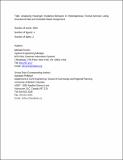| dc.contributor.author | Frumin, Michael S | |
| dc.contributor.author | Zhao, Jinhua | |
| dc.date.accessioned | 2019-03-11T11:47:36Z | |
| dc.date.available | 2019-03-11T11:47:36Z | |
| dc.date.issued | 2012-01 | |
| dc.identifier.issn | 0361-1981 | |
| dc.identifier.issn | 2169-4052 | |
| dc.identifier.uri | http://hdl.handle.net/1721.1/120845 | |
| dc.description.abstract | Passenger incidence (station arrival) behavior has been studied primarily to understand how changes to a transit service will affect passenger waiting times. The impact of one intervention (e.g., increasing frequency) could be overestimated when compared with another (e.g., improving reliability), depending on the assumption of incidence behavior. Understanding passenger incidence allows management decisions to be based on realistic behavioral assumptions. Earlier studies on passenger incidence chose their data samples from stations with a single service pattern such that the linking of passengers to services was straightforward. This choice of data samples simplifies the analysis but heavily limits the stations that can be studied. In any moderately complex network, many stations may have more than one service pattern. This limitation prevents the method from being systematically applied to the whole network and constrains its use in practice. This paper considers incidence behavior in stations with heterogeneous services and proposes a method for estimating incidence headway and waiting time by integrating disaggregate smartcard data with published timetables using schedule-based assignment. This method is applied to stations in the entire London Overground to demonstrate its practicality; incidence behavior varies across the network and across times of day and reflects headways and reliability. Incidence is much less timetable-dependent on the North London Line than on the other lines because of shorter headways and poorer reliability. Where incidence is timetable-dependent, passengers reduce their mean scheduled waiting time by more than 3 min compared with random incidence. | en_US |
| dc.publisher | SAGE Publications | en_US |
| dc.relation.isversionof | http://dx.doi.org/10.3141/2274-05 | en_US |
| dc.rights | Creative Commons Attribution-Noncommercial-Share Alike | en_US |
| dc.rights.uri | http://creativecommons.org/licenses/by-nc-sa/4.0/ | en_US |
| dc.source | Other repository | en_US |
| dc.title | Analyzing Passenger Incidence Behavior in Heterogeneous Transit Services Using Smartcard Data and Schedule-Based Assignment | en_US |
| dc.type | Article | en_US |
| dc.identifier.citation | Frumin, Michael, and Jinhua Zhao. “Analyzing Passenger Incidence Behavior in Heterogeneous Transit Services Using Smartcard Data and Schedule-Based Assignment.” Transportation Research Record: Journal of the Transportation Research Board 2274, no. 1 (January 2012): 52–60. | en_US |
| dc.contributor.department | Massachusetts Institute of Technology. Department of Civil and Environmental Engineering | en_US |
| dc.contributor.department | Massachusetts Institute of Technology. Department of Urban Studies and Planning | en_US |
| dc.contributor.department | Sloan School of Management | en_US |
| dc.contributor.mitauthor | Frumin, Michael S | |
| dc.contributor.mitauthor | Zhao, Jinhua | |
| dc.relation.journal | Transportation Research Record: Journal of the Transportation Research Board | en_US |
| dc.eprint.version | Original manuscript | en_US |
| dc.type.uri | http://purl.org/eprint/type/JournalArticle | en_US |
| eprint.status | http://purl.org/eprint/status/NonPeerReviewed | en_US |
| dc.date.updated | 2019-01-23T18:59:26Z | |
| dspace.orderedauthors | Frumin, Michael; Zhao, Jinhua | en_US |
| dspace.embargo.terms | N | en_US |
| dc.identifier.orcid | https://orcid.org/0000-0002-1929-7583 | |
| mit.license | OPEN_ACCESS_POLICY | en_US |
